#import statement python
Explore tagged Tumblr posts
Note
Harry Potter is problematic for a lot more than transphobia. The antisemitism is very present, as is anti blackness, indigenous appropriation and bastardization, anti-Irish sentiment, homophobia, Sinophobia, etc. Also, it’s not just “the author is problematic” when the books and games and movies are full of her bigotry.
I understand and I apologize if my original post on this matter made it come across as though these issues with the series aren’t also important.
That being said, the sentiment of that post remains the same: if I were to avoid posting a Harry Potter movie due to its unsavory creator and content, then there would be countless other films that I could also not morally justify posting based on their content or who worked on them, which would be counterintuitive to the goal of this blog. Plenty of films that have appeared here and will appear here in the future are problematic in various ways, on account of their age or other factors. For instance, Life is Brian, which appeared in a poll several weeks ago, contains rape jokes, transphobic jokes, ableist jokes, blackface, and potentially other offensive things that I either didn't notice or don't remember. However, the Monty Python series is considered extremely popular and iconic in a lot of circles, thus it can be interesting get a percentage of how many people here have actually seen it, even if I disagree with its contents.
The goal of this blog is not to tell you to watch or support certain films; it’s not making any statements about the quality of these films or the morality of them, it is simply an attempt to gauge how popular various films are amongst the Tumblr userbase. If you dislike certain films being posted here, I wouldn’t blame you for unfollowing or blocking me for it.
56 notes
·
View notes
Text
Python Programming Language: A Comprehensive Guide
Python is one of the maximum widely used and hastily growing programming languages within the world. Known for its simplicity, versatility, and great ecosystem, Python has become the cross-to desire for beginners, professionals, and organizations across industries.
What is Python used for

🐍 What is Python?
Python is a excessive-stage, interpreted, fashionable-purpose programming language. The language emphasizes clarity, concise syntax, and code simplicity, making it an excellent device for the whole lot from web development to synthetic intelligence.
Its syntax is designed to be readable and easy, regularly described as being near the English language. This ease of information has led Python to be adopted no longer simplest through programmers but also by way of scientists, mathematicians, and analysts who may not have a formal heritage in software engineering.
📜 Brief History of Python
Late Nineteen Eighties: Guido van Rossum starts work on Python as a hobby task.
1991: Python zero.9.0 is released, presenting classes, functions, and exception managing.
2000: Python 2.Zero is launched, introducing capabilities like list comprehensions and rubbish collection.
2008: Python 3.Zero is launched with considerable upgrades but breaks backward compatibility.
2024: Python three.12 is the modern day strong model, enhancing performance and typing support.
⭐ Key Features of Python
Easy to Learn and Use:
Python's syntax is simple and similar to English, making it a high-quality first programming language.
Interpreted Language:
Python isn't always compiled into device code; it's far done line by using line the usage of an interpreter, which makes debugging less complicated.
Cross-Platform:
Python code runs on Windows, macOS, Linux, and even cell devices and embedded structures.
Dynamic Typing:
Variables don’t require explicit type declarations; types are decided at runtime.
Object-Oriented and Functional:
Python helps each item-orientated programming (OOP) and practical programming paradigms.
Extensive Standard Library:
Python includes a rich set of built-in modules for string operations, report I/O, databases, networking, and more.
Huge Ecosystem of Libraries:
From data technological know-how to net development, Python's atmosphere consists of thousands of programs like NumPy, pandas, TensorFlow, Flask, Django, and many greater.
📌 Basic Python Syntax
Here's an instance of a easy Python program:
python
Copy
Edit
def greet(call):
print(f"Hello, call!")
greet("Alice")
Output:
Copy
Edit
Hello, Alice!
Key Syntax Elements:
Indentation is used to define blocks (no curly braces like in different languages).
Variables are declared via task: x = 5
Comments use #:
# This is a remark
Print Function:
print("Hello")
📊 Python Data Types
Python has several built-in data kinds:
Numeric: int, go with the flow, complicated
Text: str
Boolean: bool (True, False)
Sequence: listing, tuple, range
Mapping: dict
Set Types: set, frozenset
Example:
python
Copy
Edit
age = 25 # int
name = "John" # str
top = 5.Nine # drift
is_student = True # bool
colors = ["red", "green", "blue"] # listing
🔁 Control Structures
Conditional Statements:
python
Copy
Edit
if age > 18:
print("Adult")
elif age == 18:
print("Just became an person")
else:
print("Minor")
Loops:
python
Copy
Edit
for color in hues:
print(coloration)
while age < 30:
age += 1
🔧 Functions and Modules
Defining a Function:
python
Copy
Edit
def upload(a, b):
return a + b
Importing a Module:
python
Copy
Edit
import math
print(math.Sqrt(sixteen)) # Output: four.0
🗂️ Object-Oriented Programming (OOP)
Python supports OOP functions such as lessons, inheritance, and encapsulation.
Python
Copy
Edit
elegance Animal:
def __init__(self, call):
self.Call = name
def communicate(self):
print(f"self.Call makes a valid")
dog = Animal("Dog")
dog.Speak() # Output: Dog makes a legitimate
🧠 Applications of Python
Python is used in nearly each area of era:
1. Web Development
Frameworks like Django, Flask, and FastAPI make Python fantastic for building scalable web programs.
2. Data Science & Analytics
Libraries like pandas, NumPy, and Matplotlib permit for data manipulation, evaluation, and visualization.
Three. Machine Learning & AI
Python is the dominant language for AI, way to TensorFlow, PyTorch, scikit-research, and Keras.
4. Automation & Scripting
Python is extensively used for automating tasks like file managing, device tracking, and data scraping.
Five. Game Development
Frameworks like Pygame allow builders to build simple 2D games.
6. Desktop Applications
With libraries like Tkinter and PyQt, Python may be used to create cross-platform computing device apps.
7. Cybersecurity
Python is often used to write security equipment, penetration trying out scripts, and make the most development.
📚 Popular Python Libraries
NumPy: Numerical computing
pandas: Data analysis
Matplotlib / Seaborn: Visualization
scikit-study: Machine mastering
BeautifulSoup / Scrapy: Web scraping
Flask / Django: Web frameworks
OpenCV: Image processing
PyTorch / TensorFlow: Deep mastering
SQLAlchemy: Database ORM
💻 Python Tools and IDEs
Popular environments and tools for writing Python code encompass:
PyCharm: Full-featured Python IDE.
VS Code: Lightweight and extensible editor.
Jupyter Notebook: Interactive environment for statistics technological know-how and studies.
IDLE: Python’s default editor.
🔐 Strengths of Python
Easy to study and write
Large community and wealthy documentation
Extensive 0.33-birthday celebration libraries
Strong support for clinical computing and AI
Cross-platform compatibility
⚠️ Limitations of Python
Slower than compiled languages like C/C++
Not perfect for mobile app improvement
High memory usage in massive-scale packages
GIL (Global Interpreter Lock) restricts genuine multithreading in CPython
🧭 Learning Path for Python Beginners
Learn variables, facts types, and control glide.
Practice features and loops.
Understand modules and report coping with.
Explore OOP concepts.
Work on small initiatives (e.G., calculator, to-do app).
Dive into unique areas like statistics technological know-how, automation, or web development.
#What is Python used for#college students learn python#online course python#offline python course institute#python jobs in information technology
2 notes
·
View notes
Note
so for ckc in the update before season 2 came out voices were added to the characters. How does the code for that look/work? I’m working on a project on renpy and want to add those voice bites in but I haven’t been able to find a tutorial.
i pasted everything here but realized tumblr might have issues retaining indentations (and there's a LOT of code related to voice bites, specifically the dynamic syllable-reacting voice bite update we did a while ago) so i'd recommend you download the code here! you can copy and paste it, edit it to fit your needs, etc.
i've included comments to hopefully explain some of what's going on. anyway, for those interested in reading on tumblr, here are some examples of how to define characters with voices (probably most important part of the code anyway):
-------------------- init offset = -2 init python: # Below is an example voice definition: "n_voice", which is used for narrator. We used to have an issue where the narrator's voice would continue playing even after the dialogue ended, hence the added code "play_voice_loop_limited" which is meant to stop the narrator's voice bite earlier. def n_voice(event, interact=True, **kwargs): if not interact: return if event == "show_done": play_voice_loop_limited("sound/voice/n.ogg") elif event == "slow_done": renpy.music.stop(channel=u'voice0') # Below is Cody's voice, which changes depending on his age, hence lines like "if cod_bod == 'col12yo':". def cod_voice(event, interact=True, **kwargs): if not interact: return if event == "show_done": if cod_bod != 'col12yo' and cod_bod != 'avg4yo': play_voice("sound/voice/cod.ogg") if cod_bod == 'col12yo': play_voice("sound/voice/cod12yo.ogg") if cod_bod == 'avg4yo': play_voice("sound/voice/cod4yo.ogg") elif event == "slow_done": renpy.music.stop(channel=u'voice0') # But if you don't need variable voices, here's an example of a voice definition without all the if statements: def example_voice(event, interact=True, **kwargs): if not interact: return if event == "show_done": play_voice("sound/voice/example.ogg") elif event == "slow_done": renpy.music.stop(channel=u'voice0') # Now, in an "init" block instead of an "init python" block, we can define characters. Use "callback=n_voice" to indicate which voice definition to use for which character. You can omit "callback=n_voice" entirely if you don't want your character to have a voice bite. init: define n = Character(_(""), callback=n_voice, color = "#a4a4a4", window_background="textbox_narrator") define cod = Character(_("[cod_name]"), callback=cod_voice, color = "#00b7ff", window_background="textbox_cod") define mute = Character(_("[mute_name]"), color = "#00b7ff", window_background="textbox_mute")
9 notes
·
View notes
Text
A luxury handbag designer has been jailed after pleading guilty to smuggling purses made of the skins of protected reptiles, according to the U.S. Department of Justice.
Nancy Teresa Gonzalez de Barberi, found of the luxury handbag company Gzuniga, was sentenced to 18 months in prison on Monday for illegally importing merchandise from Colombia to the United States that was made from protected wildlife, authorities said.
Mauricio Giraldo, an associate of Gonzalez, was also sentenced to prison, according to the Department of Justice.
“Gzuniga was ordered to forfeit all handbags and other previously seized product, banned for three years from any activities involving commercial trade in wildlife and sentenced to serve three years of probation,” officials said. “Gonzalez was sentenced to 18 months in prison with credit for time served, a supervised release of three years and to pay a special assessment. Giraldo was sentenced to time served, approximately 22 months based on incarceration in Colombia and the United States since his extradition, a year of supervised release and to pay a special assessment.”
Another co-conspirator, John Camilo Aguilar Jaramillo, had previously pleaded guilty on April 8 and is set to be sentenced on June 27, authorities said.
Gonzalez, Giraldo and Jaramillo are Colombian citizens and were extradited to the United States to face the charges brought against them.
The caiman and python species the company was making bags out of are protected by the Convention on International Trade in Endangered Species of Wild Fauna and Flora (CITES), to which both the United States and Colombia are signatories. The trade in caimans and pythons is not completely banned but is strictly regulated under CITES rules.
“The United States signed on to CITES in an effort to help protect threatened and endangered species here and abroad from trafficking,” said Assistant Attorney General Todd Kim of the Justice Department’s Environment and Natural Resources Division in a statement released by the Department of Justice on Monday. “We will not tolerate illegal smuggling. We appreciate the efforts of our many federal and international partners who have helped with the investigation, extradition and prosecution of this case.”
The conspirators brought “hundreds of designer purses, handbags and totes into the United States by enlisting friends, relatives and even employees of Gonzalez’s manufacturing company in Colombia to wear the designer handbags or put them in their luggage while traveling on passenger airlines,” authorities said.
Once the merchandise was in the United States, the bags were delivered or shipped to the Gzuniga showroom in New York to be displayed and sold.
“The United States, in company with the international community, has established a system for overseeing the trafficking in protected species of wildlife. That system relies on a system of permits and oversight by many agencies and demands strict compliance by all those engaged in such trade,” said U.S. Attorney Markenzy Lapointe for the Southern District of Florida. “The press of business, production deadlines or other economic factors are not justification for anyone to knowingly flout the system and attempt to write their own exceptions to wildlife trafficking laws. In cooperation with our international partners, our Office will continue to require strict adherence to laws that protect our endangered species.”
An indictment charged Gzuniga, Gonzalez, Giraldo and Jaramillo with one count of conspiracy and two counts of smuggling for illegally importing designer handbags made from caiman and python skin from February 2016 to April 2019.
“The U.S. Fish and Wildlife Service is deeply committed to combatting wildlife trafficking in all its forms. The Gonzalez case underscores the importance of robust collaboration with federal and international partners to disrupt illegal wildlife trade networks,” said Assistant Director Edward Grace of the U.S. Fish and Wildlife Service’s (USFWS) Office of Law Enforcement. “This investigation uncovered a multi-year scheme that involved paid couriers smuggling undeclared handbags made of CITES-protected reptile skins into the U.S. to be sold for thousands of dollars. The Service will continue to seek justice for protected species exploited for profit, and we will hold accountable those who seek to circumvent international controls meant to regulate their sustainable trade.”
9 notes
·
View notes
Text



UPDATE: Since her band no longer exists, I changed her job into an airship mechanic. I don't have an idea for her work clothes yet, but will add them once I do!
Note: Max has no ears on purpose even in human form, also they can transform only partially where their upper body still looks like the human one.
Bio below:
Name: Max Karuna
Nicknames: Snakes (Chouma) Maxie (Franziska)
Nonbinary, uses She/they
Age: 28
Height: 167 cm (human)
Occupation: An airship mechanic/mentor to mechanic student Marisa
Family: They apparently has a MASSIVE family, but she rarely sees them due to her job (not relevant to the main story either)
Love Interest: Franziska Belmont (A sith cat/cat witch)
Friends: Chouma (A moth spirit), Marisa (her apprentice, also a moth spirit), Taiga (Arctic kitsune)
Powers:
Aquatic abilities: They can breathe underwater, dive into the depth of 4 km, swim 50 mph, and send supersonic signals through water and has some water elemental powers, though she needs to be in contact with water to do so, unlike actual elementals.
Excellent drumming skills: Self explanatory
Shapeshifting: They can switch between a human, a half or full-naga, as well as a full snake form. The latter is the size of a normal python snake, whereas her naga form can be up to 10-15 meters long.
Snake hair: She can turn her hair into snakes that have very sharp teeth, and can choke or crush things. (Being a python type, Max is one of those rarer Naga with no poison production, most Nagas are venomous snakes)
Venom: She can produce venom from her fangs and clawed hands that can either sedate, paralyze or kill a target. They aren't the most poisonous type though, so typically the venom doesn't work lethally on most healthy humans, let alone nonhuman beings.
Sixth sense for treasure: Her kind generally are well known for finding anything lost that holds importance, and she is no different. If something is missing, their bandmates often ask them to find it.
WEAKNESSES:
Max can be easily coaxed for shenanigans, which can cause some issues and messes to be cleaned. She, as a snake, is not fond of cold climates and can get the flu extremely easily during winter.
PERSONALITY:
Max is confident, outgoing and friendly person, who makes friends easily and is generally seen as a bit of a sunny personality to be around. They have a mischievous side despite seeming very chill and mature at first glance, and tends to pull pranks on people a lot. They are also very attuned to people's emotions and vibes, and she can tell when someone is having a bad day and what could perhaps help, or when is not the right time to talk about something.
They can be a bit of a potty mouth, but they tries her best to censor themselves when around kids or people who don't like swearing (at least, if they like said people)
EXTRA FACTS:
Her snake colors and pattern is inspired by the banana/coral glow python
Max enjoys ridiculously sugary and sweet drinks and freakshakes.
Max loves action movies and silly goofy b-movie horror movies, finding them hilarious
They can't sing, at all. But they do make sick beats with the drums, and she is a hobbyist drummer. (She is banned from taking part in karaoke)
Max largely follows punkish/grunge style, but also tends to enjoy including something really bright and colorful to it.
In general she tends to wear one really eccentric statement piece with almost every outfit, or at least one with a very strongly contrasting color.
Max's favorite style of party is treasure hunting, and anytime they celebrate her birthday or something, their friends arrange a hunt of some sort.
She has a habit of jokingly saying "oooo, Shiny!" about anything she likes, not just actual Jewels. It could be a friend, their girlfriend, clothes they like, etc.
Their kind tend to not have ears by default in human form, so if trying to blend in with actual humans, they have to remember to shapeshift their head to include those.
#artists on tumblr#digital art#oc reference#nonbinary#enby#lumi's art scribbles#lumi's chaotic creations#Night city parlor#Max Karuna
18 notes
·
View notes
Text
Good Code is Boring
Daily Blogs 358 - Oct 28th, 12.024
Something I started to notice and think about, is how much most good code is kinda boring.
Clever Code
Go (or "Golang" for SEO friendliness) is my third or fourth programming language that I learned, and it is somewhat a new paradigm for me.
My first language was Java, famous for its Object-Oriented Programming (OOP) paradigms and features. I learned it for game development, which is somewhat okay with Java, and to be honest, I hardly remember how it was. However, I learned from others how much OOP can get out of control and be a nightmare with inheritance inside inheritance inside inheritance.
And then I learned JavaScript after some years... fucking god. But being honest, in the start JS was a blast, and I still think it is a good language... for the browser. If you start to go outside from the standard vanilla JavaScript, things start to be clever. In an engineering view, the ecosystem is really powerful, things such as JSX and all the frameworks that use it, the compilers for Vue and Svelte, and the whole bundling, and splitting, and transpiling of Rollup, ESBuild, Vite and using TypeScript, to compile a language to another, that will have a build process, all of this, for an interpreted language... it is a marvel of engineering, but it is just too much.
Finally, I learned Rust... which I kinda like it. I didn't really make a big project with it, just a small CLI for manipulating markdown, which was nice and when I found a good solution for converting Markdown AST to NPF it was a big hit of dopamine because it was really elegant. However, nowadays, I do feel like it is having the same problems of JavaScript. Macros are a good feature, but end up being the go-to solution when you simply can't make the code "look pretty"; or having to use a library to anything a little more complex; or having to deal with lifetimes. And if you want to do anything a little more complex "the Rust way", you will easily do head to head with a wall of skill-issues. I still love it and its complexity, and for things like compiler and transpilers it feels like a good shot.
Going Go
This year I started to learn Go (or "Golang" for SEO friendliness), and it has being kinda awesome.
Go is kinda like Python in its learning curve, and it is somewhat like C but without all the needing of handling memory and needing to create complex data structured from scratch. And I have never really loved it, but never really hated it, since it is mostly just boring and simple.
There are no macros or magic syntax. No pattern matching on types, since you can just use a switch statement. You don't have to worry a lot about packages, since the standard library will cover you up to 80% of features. If you need a package, you don't need to worry about a centralized registry to upload and the security vulnerability of a single failure point, all packages are just Git repositories that you import and that's it. And no file management, since it just uses the file system for packages and imports.
And it feels like Go pretty much made all the obvious decisions that make sense, and you mostly never question or care about them, because they don't annoy you. The syntax doesn't get into your way. And in the end you just end up comparing to other languages' features, saying to yourself "man... we could save some lines here" knowing damn well it's not worth it. It's boring.
You write code, make your feature be completed in some hours, and compile it with go build. And run the binary, and it's fast.
Going Simple
And writing Go kinda opened a new passion in programming for me.
Coming from JavaScript and Rust really made me be costumed with complexity, and going now to Go really is making me value simplicity and having the less moving parts are possible.
I am becoming more aware from installing dependencies, checking to see their dependencies, to be sure that I'm not putting 100 projects under my own. And when I need something more complex but specific, just copy-and-paste it and put the proper license and notice of it, no need to install a whole project. All other necessities I just write my own version, since most of the time it can be simpler, a learning opportunity, and a better solution for your specific problem. With Go I just need go build to build my project, and when I need JavaScript, I just fucking write it and that's it, no TypeScript (JSDoc covers 99% of the use cases for TS), just write JS for the browser, check if what you're using is supported by modern browsers, and serve them as-is.
Doing this is really opening some opportunities to learn how to implement solutions, instead of just using libraries or cumbersome language features to implement it, since I mostly read from source-code of said libraries and implement the concept myself. Not only this, but this is really making me appreciate more standards and tooling, both from languages and from ecosystem (such as web standards), since I can just follow them and have things work easily with the outside world.
The evolution
And I kinda already feel like this is making me a better developer overhaul. I knew that with an interesting experiment I made.
One of my first actual projects was, of course, a to-do app. I wrote it in Vue using Nuxt, and it was great not-gonna-lie, Nuxt and Vue are awesome frameworks and still one of my favorites, but damn well it was overkill for a to-do app. Looking back... more than 30k lines of code for this app is just too much.
And that's what I thought around the start of this year, which is why I made an experiment, creating a to-do app in just one HTML file, using AlpineJS and PicoCSS.
The file ended up having just 350 files.
Today's artists & creative things Music: Torna a casa - by Måneskin
© 2024 Gustavo "Guz" L. de Mello. Licensed under CC BY-SA 4.0
4 notes
·
View notes
Text
"DCA"(DIPLOMA IN COMPUTER APPLICATION)
The best career beginning course....

Golden institute is ISO 9001-2015 certified institute. Here you can get all types of computer courses such as DCA, CFA , Python, Digital marketing, and Tally prime . Diploma in Computer Applications (DCA) is a 1 year "Diploma Course" in the field of Computer Applications which provides specialization in various fields such as Fundamentals & Office Productivity tools, Graphic Design & Multimedia, Programming and Functional application Software.

A few of the popular DCA study subjects are listed below
Basic internet concepts Computer Fundamentals Introduction to programming Programming in C RDBMS & Data Management Multimedia Corel draw Tally ERP 9.0 Photoshop
Benefits of Diploma in Computer Application (DCA)
After completion of the DCA course student will able to join any computer jobs with private and government sectors. The certification of this course is fully valid for any government and private deportment worldwide. DCA is the only best option for the student to learn computer skills with affordable fees.
DCA Computer course : Eligibilities are here... Students aspiring to pursue Diploma in Computer Applications (DCA) course must have completed their higher school/ 10 + 2 from a recognized board. Choosing Computers as their main or optional subject after class 10 will give students an additional edge over others. Apart from this no other eligibility criteria is set for aspirants. No minimum cutoff is required.

"TALLY"
A Tally is accounting software. To pursue Tally Course (Certificate and Diploma) you must have certain educational qualifications to thrive and prosper. The eligibility criteria for the tally course is given below along with all significant details on how to approach learning Tally, and how you can successfully complete the course. Generally, the duration of a Tally course is 6 month to 1 year ,but it varies depending on the tally institution you want to join. Likewise, tally course fees are Rs. 10000-20000 on average but it also varies depending on what type of tally course or college you opt for. accounting – Accounting plays a pivotal role in Tally
Key Benefits of the Course:
Effective lessons (topics are explained through a step-by-step process in a very simple language) The course offers videos and e-books (we have two options Video tutorials in Hindi2. e-book course material in English) It offers a planned curriculum (the entire tally online course is designed to meet the requirements of the industry.) After the completion of the course, they offer certificates to the learners.
Tally Course Syllabus – Subjects To Learn Accounting Payroll Taxation Billing Banking Inventory
Tally Course
Eligibility criteria: 10+2 in commerce stream Educational level: Certificate or Diploma Course fee: INR 2200-5000 Skills required: Accounting, Finance, Taxation, Interpersonal Skills Scope after the course: Accountant, Finance Manager, Chartered Accountant, Executive Assistant, Operations Manager Average salary: INR 5,00,000 – 10,00,000

"In this Python course"
Rapidly develop feature-rich applications using Python's built-in statements, functions, and collection types. Structure code with classes, modules, and packages that leverage object-oriented features. Create multiple data accessors to manage various data storage formats. Access additional features with library modules and packages.
Python for Web Development – Flask Flask is a popular Python API that allows experts to build web applications. Python 2.6 and higher variants must install Flask, and you can import Flask on any Python IDE from the Flask package. This section of the course will help you install Flask and learn how to use the Python Flask Framework.
Subjects covered in Python for Web development using Flask:
Introduction to Python Web Framework Flask Installing Flask Working on GET, POST, PUT, METHODS using the Python Flask Framework Working on Templates, render template function
Python course fees and duration
A Python course costs around ₹2200-5000.This course fees can vary depending on multiple factors. For example, a self-paced online course will cost you less than a live interactive online classroom session, and offline training sessions are usually expensive ones. This is mainly because of the trainers’ costs, lab assistance, and other facilities.
Some other factors that affect the cost of a Python course are its duration, course syllabus, number of practical sessions, institute reputation and location, trainers’ expertise, etc. What is the duration of a Python course? The duration of a basic Python course is generally between 3 month to 6 months, and advanced courses can be 1 year . However, some courses extend up to 1 year and more when they combine multiple other courses or include internship programs.
Advantages of Python Python is easy to learn and put into practice. … Functions are defined. … Python allows for quick coding. … Python is versatile. … Python understands compound data types. … Libraries in data science have Python interfaces. … Python is widely supported.

"GRAPHIC DESIGN"
Graphic design, in simple words, is a means that professional individuals use to communicate their ideas and messages. They make this communication possible through the means of visual media.
A graphic designing course helps aspiring individuals to become professional designers and create visual content for top institutions around the world. These courses are specialized to accommodate the needs and requirements of different people. The course is so popular that one does not even need to do a lot of research to choose their preferred colleges, institutes, or academies for their degrees, as they are almost mainstream now.
A graphic design course have objectives:
To train aspirants to become more creative with their visual approach. To train aspirants to be more efficient with the technical aspects of graphics-related tasks and also to acquaint them with relevant aspects of a computer. To train individuals about the various aspects of 2-D and 3-D graphics. To prepare aspirants to become fit for a professional graphic designing profession.
Which course is best for graphic design? Best graphic design courses after 12th - Graphic … Certificate Courses in Graphic Design: Adobe Photoshop. CorelDraw. InDesign. Illustrator. Sketchbook. Figma, etc.
It is possible to become an amateur Graphic Designer who is well on the road to becoming a professional Graphic Designer in about three months. In short, three months is what it will take to receive the professional training required to start building a set of competitive professional job materials.

THE BEST COMPUTER INSTITUTE GOLDEN EDUCATION,ROPNAGAR "PUNJAB"
The best mega DISCOUNT here for your best course in golden education institute in this year.
HURRY UP! GUYS TO JOIN US...
Don't miss the chance
You should go to our institute website
WWW.GOLDEN EDUCATION
CONTACT US: 98151-63600
VISIT IT:
#GOLDEN EDUCATION#INSTITUTE#COURSE#career#best courses#tallyprime#DCA#GRAPHICAL#python#ALL COURSE#ROOPAR
2 notes
·
View notes
Text
How do I learn Python in depth?
Improving Your Python Skills
Writing Python Programs Basics: Practice the basics solidly.
Syntax and Semantics: Make sure you are very strong in variables, data types, control flow, functions, and object-oriented programming.
Data Structures: Be able to work with lists, tuples, dictionaries, and sets, and know when to use which.
Modules and Packages: Study how to import and use built-in and third-party modules.
Advanced Concepts
Generators and Iterators: Know how to develop efficient iterators and generators for memory-efficient code.
Decorators: Learn how to dynamically alter functions using decorators.
Metaclasses: Understand how classes are created and can be customized.
Context Managers: Understand how contexts work with statements.
Project Practice
Personal Projects: You will work on projects that you want to, whether building a web application, data analysis tool, or a game.
Contributing to Open Source: Contribute to open-source projects in order to learn from senior developers. Get exposed to real-life code.
Online Challenges: Take part in coding challenges on HackerRank, LeetCode, or Project Euler.
Learn Various Libraries and Frameworks
Scientific Computing: NumPy, SciPy, Pandas
Data Visualization: Matplotlib, Seaborn
Machine Learning: Scikit-learn, TensorFlow, PyTorch
Web Development: Django, Flask
Data Analysis: Dask, Airflow
Read Pythonic Code
Open Source Projects: Study the source code of a few popular Python projects. Go through their best practices and idiomatic Python.
Books and Tutorials: Read all the code examples in books and tutorials on Python.
Conferences and Workshops
Attend conferences and workshops that will help you further your skills in Python. PyCon is an annual Python conference that includes talks, workshops, and even networking opportunities. Local meetups will let you connect with other Python developers in your area.
Learn Continuously
Follow Blogs and Podcasts: Keep reading blogs and listening to podcasts that will keep you updated with the latest trends and developments taking place within the Python community.
Online Courses: Advanced understanding in Python can be acquired by taking online courses on the subject.
Try It Yourself: Trying new techniques and libraries expands one's knowledge.
Other Recommendations
Readable-Clean Code: For code writing, it's essential to follow the style guide in Python, PEP
Naming your variables and functions as close to their utilization as possible is also recommended.
Test Your Code: Unit tests will help in establishing the correctness of your code.
Coding with Others: Doing pair programming and code reviews would provide you with experience from other coders.
You are not Afraid to Ask for Help: Never hesitate to ask for help when things are beyond your hand-on areas, be it online communities or mentors.
These steps, along with consistent practice, will help you become proficient in Python development and open a wide range of possibilities in your career.
2 notes
·
View notes
Text
How much Python should one learn before beginning machine learning?
Before diving into machine learning, a solid understanding of Python is essential. :
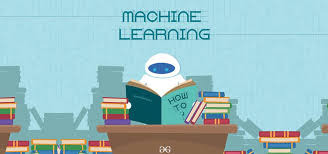
Basic Python Knowledge:
Syntax and Data Types:
Understand Python syntax, basic data types (strings, integers, floats), and operations.
Control Structures:
Learn how to use conditionals (if statements), loops (for and while), and list comprehensions.
Data Handling Libraries:
Pandas:
Familiarize yourself with Pandas for data manipulation and analysis. Learn how to handle DataFrames, series, and perform data cleaning and transformations.
NumPy:
Understand NumPy for numerical operations, working with arrays, and performing mathematical computations.
Data Visualization:
Matplotlib and Seaborn:
Learn basic plotting with Matplotlib and Seaborn for visualizing data and understanding trends and distributions.
Basic Programming Concepts:
Functions:
Know how to define and use functions to create reusable code.
File Handling:
Learn how to read from and write to files, which is important for handling datasets.
Basic Statistics:
Descriptive Statistics:
Understand mean, median, mode, standard deviation, and other basic statistical concepts.
Probability:
Basic knowledge of probability is useful for understanding concepts like distributions and statistical tests.
Libraries for Machine Learning:
Scikit-learn:
Get familiar with Scikit-learn for basic machine learning tasks like classification, regression, and clustering. Understand how to use it for training models, evaluating performance, and making predictions.
Hands-on Practice:
Projects:
Work on small projects or Kaggle competitions to apply your Python skills in practical scenarios. This helps in understanding how to preprocess data, train models, and interpret results.
In summary, a good grasp of Python basics, data handling, and basic statistics will prepare you well for starting with machine learning. Hands-on practice with machine learning libraries and projects will further solidify your skills.
To learn more drop the message…!
2 notes
·
View notes
Text
This Week in Rust 580
Hello and welcome to another issue of This Week in Rust! Rust is a programming language empowering everyone to build reliable and efficient software. This is a weekly summary of its progress and community. Want something mentioned? Tag us at @ThisWeekInRust on X (formerly Twitter) or @ThisWeekinRust on mastodon.social, or send us a pull request. Want to get involved? We love contributions.
This Week in Rust is openly developed on GitHub and archives can be viewed at this-week-in-rust.org. If you find any errors in this week's issue, please submit a PR.
Want TWIR in your inbox? Subscribe here.
Updates from Rust Community
Foundation
2024 in Review: Rust Foundation Annual Report Preview
Project/Tooling Updates
Announcing axum 0.8.0
Fish 4.0: The Fish Of Theseus
Rust and libcosmic in Bottles Next
gitlab-tokens-exporter 1.0.0 - Exports the status of gitlab tokens as Prometheus metrics
Danube pub/sub messaging platform - updates v0.2.0
Observations/Thoughts
Catching up with async Rust
[audio] Reliable software: An interview with Jon Gjengset
[audio] Rust in Google with Lars Bergstrom
[video] 12 months with the Bevy Game Engine - This Year in Bevy 2024
Rust Walkthroughs
A Complete Guide to WASIp2 for Rust and Python Programmers
Crate of the Week
This week's crate is fake, a library (and recently console utility) to generate fake data of various types.
Thanks to llogiq for the half-self-suggestion!
Please submit your suggestions and votes for next week!
Calls for Testing
An important step for RFC implementation is for people to experiment with the implementation and give feedback, especially before stabilization. The following RFCs would benefit from user testing before moving forward:
RFCs
No calls for testing were issued this week.
Rust
No calls for testing were issued this week.
Rustup
No calls for testing were issued this week.
If you are a feature implementer and would like your RFC to appear on the above list, add the new call-for-testing label to your RFC along with a comment providing testing instructions and/or guidance on which aspect(s) of the feature need testing.
Call for Participation; projects and speakers
CFP - Projects
Always wanted to contribute to open-source projects but did not know where to start? Every week we highlight some tasks from the Rust community for you to pick and get started!
Some of these tasks may also have mentors available, visit the task page for more information.
* clearscreen - Refactor winapi usage to windows-sys
rama - support HAR exporter (http) layer in rama
rama - add full-stack rama benchmarks
If you are a Rust project owner and are looking for contributors, please submit tasks here or through a PR to TWiR or by reaching out on X (formerly Twitter) or Mastodon!
CFP - Events
Are you a new or experienced speaker looking for a place to share something cool? This section highlights events that are being planned and are accepting submissions to join their event as a speaker.
If you are an event organizer hoping to expand the reach of your event, please submit a link to the website through a PR to TWiR or by reaching out on X (formerly Twitter) or Mastodon!
Updates from the Rust Project
331 pull requests were merged in the last week
enable LSX feature for LoongArch OpenHarmony target
explicitly set float ABI for all ARM targets
A couple datalog/borrowck cleanups
rustc_codegen_ssa: Buffer file writes in link_rlib
account for C string literals and format_args in HiddenUnicodeCodepoints lint
account for removal of multiline span in suggestion
actually print all the relevant parts of a coroutine in verbose mode
add --no-capture/--nocapture as bootstrap arguments
add a compiler intrinsic to back bigint_helper_methods
avoid ICE in borrowck
compiler: add a statement-of-intent to rustc_abi
compute liveness constraints in location-sensitive polonius
consider arm to diverge if guard diverges
consider empty-unreachable otherwise branches in MatchBranchSimplification
default to short backtraces for dev builds of rustc itself
implement default_overrides_default_fields lint
improve default target options for x86_64-unknown-linux-none
improve type mutation for certain structures
make -Csoft-float have an effect on all ARM targets
make ty::Error implement all auto traits
make sure we check the future type is Sized in AsyncFn*
skip parenthesis around tuple struct field calls
skip parenthesis if . makes statement boundary unambiguous
some random region tweaks
strip debuginfo from rustc-main and rustdoc
miri: FD handling: avoid unnecessary dynamic downcasts
miri: epoll: avoid some clones
miri: error on some invalid flag combinations
miri: fix toolchain flag parsing
miri: socket read/write cleanup
stabilize const_alloc_layout
stabilize const_swap
stabilize style_edition = "2024" in-tree
make slice::as_flattened_mut unstably const
tidy up bigint multiplication methods
from iterator for more tuples
add into_array conversion destructors for Box, Rc, and Arc
avoid short writes in LineWriter
unify fs::copy and io::copy on Linux
fix forgetting to save statx availability on success
fix mistake in windows file open
fix renaming symlinks on Windows
windows: use WriteFile to write to a UTF-8 console
windows: use FILE_ALLOCATION_INFO for truncation
cargo: fix(package): check dirtiness of path fields in manifest
cargo: fix(package): check dirtiness of symlinks source files
cargo: fix(package): warn if symlinks checked out as plain text files
cargo: refactor(package): split cargo_package to modules
cargo: fix: assure possibly blocking non-files (like FIFOs) won't be picked up for publishing
cargo: moved manifest metadata tracking from fingerprint to dep info
cargo: test: make path arguments more generic and flexible
cargo: test: relax bad_crate_type to only match error message prefix
cargo: test: relax panic output assertion
rustdoc: use shorter paths as preferred canonical paths
unsafe binder support in rustdoc
clippy: borrow_interior_mutable_const ICE into FN
clippy: auto-fix if_not_else
clippy: correct suggestion for manual_div_ceil lint
clippy: do not remove required parentheses in borrow_as_ptr suggestion
clippy: do not trigger trailing_empty_array in tests
clippy: fix arguments of ExprKind::MethodCall
clippy: fix parentheses when replacing matches!(…, None) with .is_none()
clippy: make inconsistent_struct_constructor "all fields are shorthand" requirement configurable
clippy: remove description of known problems in match_same_arms that have already been resolved
clippy: remove obsolete comment
clippy: use the correct ParamEnv when checking future's output type
clippy: use the full lifetime name in suggestions
rust-analyzer: cleanup target fetching for cargo metadata
rust-analyzer: cleanup toolchain info fetching
rust-analyzer: decouple proc-macro server protocol from the server implementation
rust-analyzer: show go-to-type-def actions for subst when hovering
rust-analyzer: show substitution where hovering over generic things
rust-analyzer: unify handling of path diagnostics in hir-ty
rust-analyzer: fix bug of "fill match arm" action in tokio::main macro
rust-analyzer: fix missing name enum when hovering on fields in variants
rust-analyzer: fix render of literal to be rendered in codeblock
rust-analyzer: fix replace-if-let-with-match generates non-exhausive match
rust-analyzer: avoid generating colliding names in extract_variable
rust-analyzer: consider Enum::Variant even when it comes from a different crate
rust-analyzer: do not merge spans if they have different anchors
rust-analyzer: fix flycheck diagnostics flickering for binary targets
rust-analyzer: fix invalid -O flag used by cfg discovery
rust-analyzer: fix metrics workflow using the wrong download-artifact version
rust-analyzer: incorrect file_id used for ranges in outgoing calls
rust-analyzer: populate cargo config env vars for crates
rust-analyzer: implement parameter variance inference
rust-analyzer: treat ; as a terminator rather part of a glued expression
Rust Compiler Performance Triage
A pretty quiet week, with the exception of a significant improvement due to landing LTO for C / C++ programs compiled as part of the build.
Triage done by @simulacrum. Revision range: 0eca4dd3..93722f7e
0 Regressions, 1 Improvements, 1 Mixed; 0 of them in rollups 53 artifact comparisons made in total
Full report here
Approved RFCs
Changes to Rust follow the Rust RFC (request for comments) process. These are the RFCs that were approved for implementation this week:
No RFCs were approved this week.
Final Comment Period
Every week, the team announces the 'final comment period' for RFCs and key PRs which are reaching a decision. Express your opinions now.
RFCs
No RFCs entered Final Comment Period this week.
Tracking Issues & PRs
Rust
No RFCs entered Final Comment Period this week.
Cargo
No Cargo Tracking Issues or PRs entered Final Comment Period this week.
Language Team
No Language Team Proposals entered Final Comment Period this week.
Language Reference
No Language Reference RFCs entered Final Comment Period this week.
Unsafe Code Guidelines
No Unsafe Code Guideline Tracking Issues or PRs entered Final Comment Period this week.
New and Updated RFCs
[new] RFC: Foo { .. } pattern matches non-struct types
[new] RFC: add LLM text version to rustdoc
[new] RFC: cfg_os_version_min
Upcoming Events
Rusty Events between 2025-01-01 - 2025-01-29 🦀
Virtual
2025-01-02 | Virtual (Berlin, DE) | OpenTechSchool Berlin + Rust Berlin
Rust Hack and Learn | Mirror: Rust Hack n Learn Meetup
2025-01-04 | Virtual (Kampala, UG) | Rust Circle Kampala
Rust Circle Meetup
2025-01-08 | Virtual (Tel Aviv-Yafo, IL) | Code Mavens 🦀 - 🐍 - 🐪
BlockMesh Network implemented in Rust with Ohad Dahan (Virtual, English)
2025-01-09 | Virtual (Charlottesville, VA, US) | Charlottesville Rust Meetup
Crafting Interpreters in Rust Collaboratively
2025-01-09 | Miami, FL, US | Rust Miami
Rust / Wasm on Serverless and Frontend
2025-01-09 | Virtual (Nürnberg, DE) | Rust Nuremberg
Rust Nürnberg online
2025-01-14 | Virtual (Dallas, TX, US) | Dallas Rust User Meetup
Second Tuesday
2025-01-15 | Virtual (Tel Aviv-Yafo, IL) | Code Mavens 🦀 - 🐍 - 🐪
An introduction to WASM in Rust with Márk Tolmács (Virtual, English)
2025-01-15 | Virtual (Vancouver, BC, CA) | Vancouver Rust
Leptos
2025-01-16 | Virtual (Berlin, DE) | OpenTechSchool Berlin + Rust Berlin
Rust Hack and Learn | Mirror: Rust Hack n Learn Meetup
2025-01-21 | Virtual (Tel Aviv-Yafo, IL) | Rust 🦀 TLV
Exploring Rust Enums with Yoni Peleg (Virtual, Hebrew)
2025-01-21 | Virtual (Washington, DC, US) | Rust DC
Mid-month Rustful
2025-01-22 | Virtual (Rotterdam, NL) | Bevy Game Development
Bevy Meetup #8
2025-01-26 | Virtual (Tel Aviv-Yafo, IL) | Rust 🦀 TLV
Rust and embedded programming with Leon Vak (online in Hebrew)
Asia
2025-01-12 | Virtual (Tel Aviv-Yafo, IL) | Rust 🦀 TLV
In person Rust January 2025 at Abra in Raanana
Europe
2025-01-08 | Girona, ES | Rust Girona
Rust Girona - 2025 01
2025-01-08 | Reading, UK | Reading Rust Workshop
Reading Rust Meetup
2025-01-09 | Oslo, NO | Rust Oslo
Rust Hack'n'Learn at Kampen Bistro
2025-01-14 | Mannheim, DE | Hackschool - Rhein-Neckar
Rust Your Engines #5
2025-01-16 | Amsterdam, NL | Rust Developers Amsterdam Group
Meetup @ Avalor AI
2025-01-16 | Karlsruhe, DE | Rust Hack & Learn Karlsruhe
Karlsruhe Rust Hack and Learn Meetup bei BlueYonder
2025-01-21 | Ghent, BE | Systems Programming Ghent
Tech Talks & Dinner: Insights on Systems Programming Side Projects (in Rust) - Leptos (full-stack Rust with webassembly), Karyon (distributed p2p software in Rust), FunDSP (audio synthesis in Rust)
2025-01-21 | Leipzig, SN, DE | Rust - Modern Systems Programming in Leipzig
Self-Organized Peer-to-Peer Networks using Rust
2025-01-23 | Barcelona, ES | Barcelona Free Software
Why Build a New Browser Engine in Rust?
2025-01-28 | Aarhus, DK | Rust Aarhus
Hack Night - Advent of Code
North America
2025-01-08 | Austin, TX, US | Rust ATX
Rust Dinner - Pinthouse Pizza South Lamar
2025-01-09 | Mountain View, CA, US | Hacker Dojo
RUST MEETUP at HACKER DOJO
2025-01-10 | Boston, MA, US | Boston Rust Meetup
Lechmere Rust Lunch, Jan 10
2025-01-16 | Nashville, TN, US | Music City Rust Developers
Rust Game Development Series 1: Community Introductions
2025-01-18 | Boston, MA, US | Boston Rust Meetup
Back Bay Rust Lunch, Jan 18
2025-01-21 | San Francisco, CA, US | San Francisco Rust Study Group
Rust Hacking in Person
2025-01-22 | Austin, TX, US | Rust ATX
Rust Lunch - Fareground
If you are running a Rust event please add it to the calendar to get it mentioned here. Please remember to add a link to the event too. Email the Rust Community Team for access.
Jobs
Please see the latest Who's Hiring thread on r/rust
Quote of the Week
Hear, hear! Rust is the real deep state. They knew all along that memory-related bugs would dominate the Vulnerability Rating Taxonomy. Coincidence? I think not. 🐛🔧
– @[email protected] on mastodon
Thanks to llogiq for the suggestion!
Please submit quotes and vote for next week!
This Week in Rust is edited by: nellshamrell, llogiq, cdmistman, ericseppanen, extrawurst, U007D, joelmarcey, mariannegoldin, bennyvasquez, bdillo Email list hosting is sponsored by The Rust Foundation
Discuss on r/rust
1 note
·
View note
Text
Python Day 2
Today I am starting off with exercise 13. Exercise 13 introduces the concepts of variables, modules, and argv.
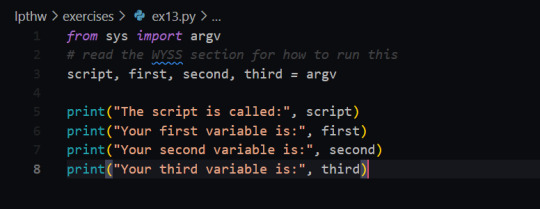
[ID: Exercise 13 code. It imports the argv module from sys, then uses argv to create 4 variables, script, first, second, and third. Next print() is used to print out the different variables /ID]





When calling the program I was confused as to why I got the error of too many variables. Looking into this I found that the first variable of 'argv' is always going to be the script. I then fixed that and added in script as the first variable.
Next for the study drill I wrote a new variable and updated the code to print the retrieved information.


Alrighty then - onto exercise 14. Exercise 14 is about practicing prompts and variables.
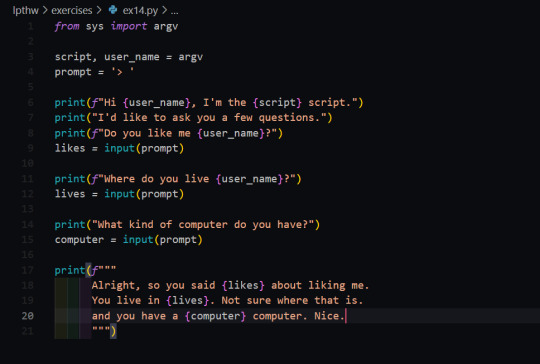
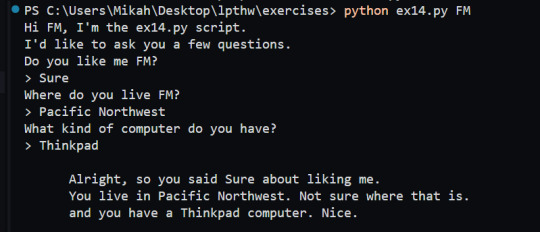
In the study drills I updated the script with a new prompt and print statement.
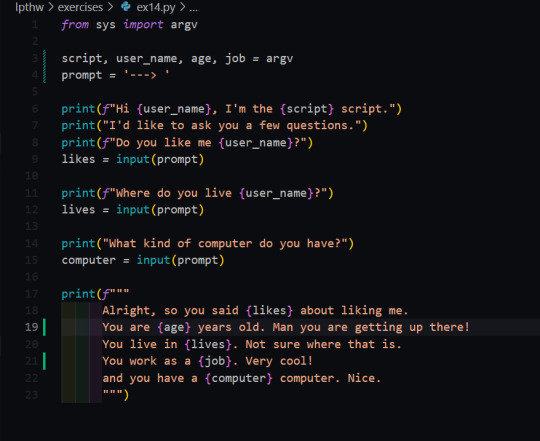
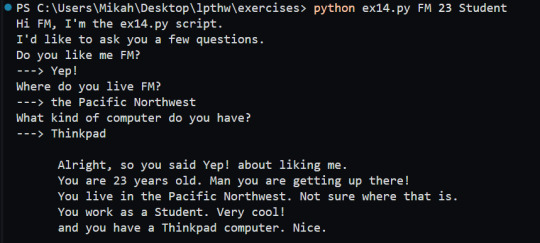
Exercise 15 is a simple program that prints out the contents of a file. An important thing to note is to always close the file when doing things like this!
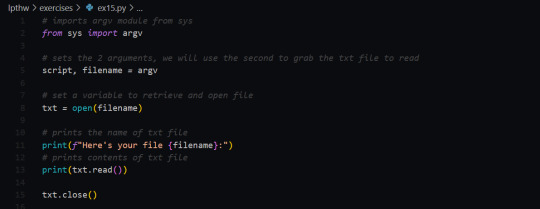
Exercise 16 practices making a copy of a file and then updating it with 3 lines from user input.
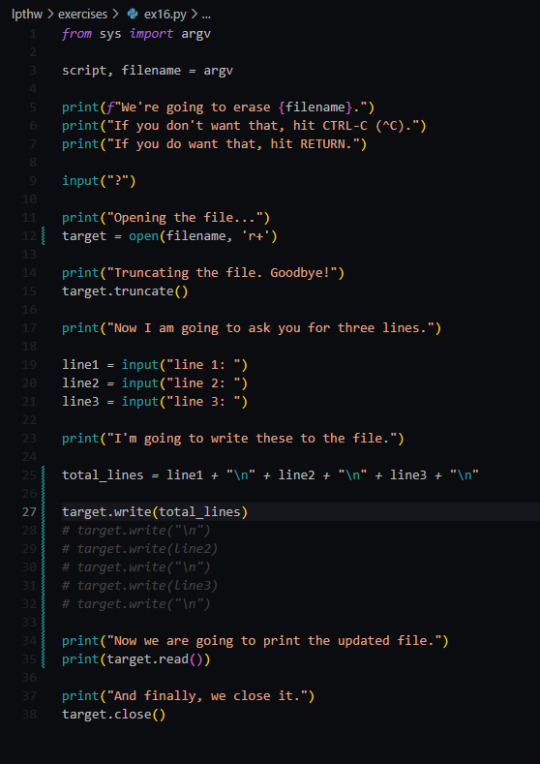
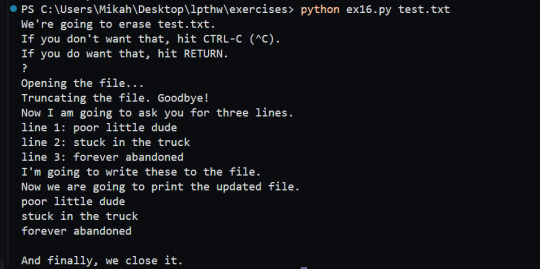
I ended up running into the issue where it was saying that it couldn't read the file. I ended up finding out that .read() starts from the cursor position - and if the cursor is at the end of the file from writing it you will not have your file printed.


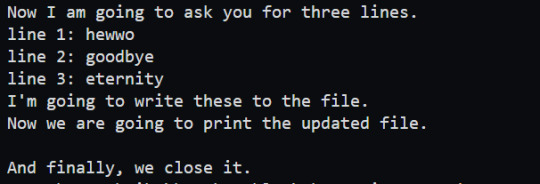
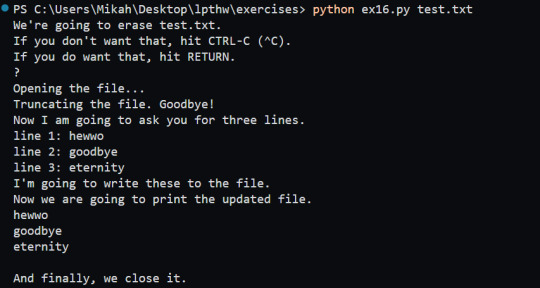
Exercise 17 is practicing copying files over and was relatively simple.
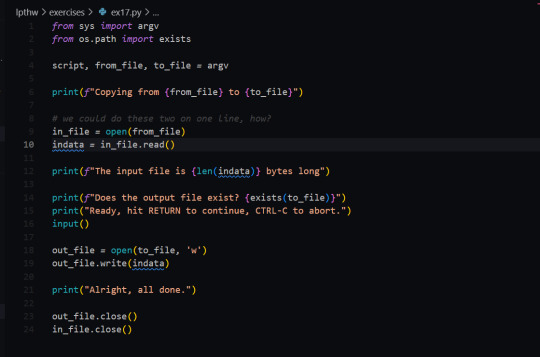

#learn python with F.M.#learn to code#learn python#coding resources#python#coding#lpthw#transgender programmer#codeblr#code#image undescribed#Sorry for not adding ID folks - my spoons are too low
4 notes
·
View notes
Note
Is there any piece of British media you enjoy a lot? I want to learn the British accent (for my career, ofc) and it's the best way to get myself into it
Ooh, that's a really intriguing question, and I'd love to hear about your career if you don't mind sharing because it sounds interesting! I like to do voiceovers for a hobby so I definitely get the importance of having media to compare and go off of. Of course, I have no clue about specific accents so you might have to do additional research if you need a very specific region, but I'll try my best to give a few pieces of media that might be able to help.
•The Magnus Archives/The Magnus Protocol: It's a horror podcast about an institute that takes in statements on the paranormal, and has a wide array of characters to use for reference. And since it's an audio performance, it might be easier to pick up inflections and things like that. Not to mention it's incredibly entertaining.
•The Outlaws: I never got around to finishing this show, but it's pretty good. It's about a group of people doing community service that end up getting involved in a drug gang ring. It's pretty funny even though quite a bit of the comedy comes from second-hand embarrassment, but it's definitely not bad.
•End of the F***ing World: That's another show I haven't finished primarily because I was watching it with my brother. From what I can remember, it's about two kids (one a moody teen girl and the other a teen boy who thinks he's a psychopath) who run off to find the girl's estranged father. Unfortunately, I don't remember much about it, but from what I do know it was entertaining.
•Extras: It's sort've like The Office (in fact it was written and stars two of the guys who wrote the UK Office) but it follows a guy who's trying to become a prominent actor and fails miserably. It's got a lot of guest appearances and it's a relatively short series as well. I personally hate shows like The Office, but this was one I liked.
•Haunting of Bly Manor: Not as good as Haunting of Hill House in my opinion, but it's still an incredibly good although short horror series. It's about a woman who goes to care for two kids for their uncle after they were orphaned. It'll definitely be entertaining to watch and it's worth a try.
•Hitchhiker's Guide to the Galaxy Radio Show/TV Series: You already know what Hitchhiker's Guide is so I won't explain it, but if I had to choose one or the other to suggest I would go with the radio show. The TV series is amazing, don't get me wrong, but for your purposes I find that audio-only pieces of media would work best. This is the version I prefer to listen to.
•Anything Monty Python: I can't guarantee that this would be the best source because it genuinely might be too entertaining. I fuckin love Monty Python with everything I have and there's not much I can say about it because it's just something you have to experience.
Of course, you can also look towards prominent British actors like Tim Curry, Angela Lansbury, and John Oliver, which is something I would suggest doing as well. Personally another thing that I've found to be helpful is also practicing a transatlantic accent, which is basically halfway between an American accent and a British accent. The only two people I can think of off the top of my head that have a very good transatlantic accent are Vincent Price and David Ogden Stiers (specifically as his role as Charles Winchester in M*A*S*H), so that might be some good warm-up. Hopefully this was of some help!
#I wish you the best of luck with the accent!#I'm not good with British media since I'm probably one of the things that's considered the exact opposite lmao#but I tried my best#if you ever need a good reference for Southern accents though I'm your guy because GOD have I seen some bad ones#and it's not just Tom Hanks in Forrest Gump or Nic Cage in Con Air#good lord those make me cringe if I think about em too hard#asks#answered asks
3 notes
·
View notes
Text
The C Programming Language Compliers – A Comprehensive Overview
C is a widespread-purpose, procedural programming language that has had a profound have an impact on on many different contemporary programming languages. Known for its efficiency and energy, C is frequently known as the "mother of all languages" because many languages (like C++, Java, and even Python) have drawn inspiration from it.
C Lanugage Compliers

Developed within the early Seventies via Dennis Ritchie at Bell Labs, C changed into firstly designed to develop the Unix operating gadget. Since then, it has emerge as a foundational language in pc science and is still widely utilized in systems programming, embedded systems, operating systems, and greater.
2. Key Features of C
C is famous due to its simplicity, performance, and portability. Some of its key functions encompass:
Simple and Efficient: The syntax is minimalistic, taking into consideration near-to-hardware manipulation.
Fast Execution: C affords low-degree get admission to to memory, making it perfect for performance-critical programs.
Portable Code: C programs may be compiled and run on diverse hardware structures with minimal adjustments.
Rich Library Support: Although simple, C presents a preferred library for input/output, memory control, and string operations.
Modularity: Code can be written in features, improving readability and reusability.
Extensibility: Developers can without difficulty upload features or features as wanted.
Three. Structure of a C Program
A primary C application commonly consists of the subsequent elements:
Preprocessor directives
Main function (main())
Variable declarations
Statements and expressions
Functions
Here’s an example of a easy C program:
c
Copy
Edit
#include <stdio.H>
int important()
printf("Hello, World!N");
go back zero;
Let’s damage this down:
#include <stdio.H> is a preprocessor directive that tells the compiler to include the Standard Input Output header file.
Go back zero; ends this system, returning a status code.
4. Data Types in C
C helps numerous facts sorts, categorised particularly as:
Basic kinds: int, char, glide, double
Derived sorts: Arrays, Pointers, Structures
Enumeration types: enum
Void kind: Represents no fee (e.G., for functions that don't go back whatever)
Example:
c
Copy
Edit
int a = 10;
waft b = three.14;
char c = 'A';
five. Control Structures
C supports diverse manipulate structures to permit choice-making and loops:
If-Else:
c
Copy
Edit
if (a > b)
printf("a is more than b");
else
Switch:
c
Copy
Edit
switch (option)
case 1:
printf("Option 1");
smash;
case 2:
printf("Option 2");
break;
default:
printf("Invalid option");
Loops:
For loop:
c
Copy
Edit
printf("%d ", i);
While loop:
c
Copy
Edit
int i = 0;
while (i < five)
printf("%d ", i);
i++;
Do-even as loop:
c
Copy
Edit
int i = zero;
do
printf("%d ", i);
i++;
while (i < 5);
6. Functions
Functions in C permit code reusability and modularity. A function has a return kind, a call, and optionally available parameters.
Example:
c
Copy
Edit
int upload(int x, int y)
go back x + y;
int important()
int end result = upload(3, 4);
printf("Sum = %d", result);
go back zero;
7. Arrays and Strings
Arrays are collections of comparable facts types saved in contiguous memory places.
C
Copy
Edit
int numbers[5] = 1, 2, three, 4, five;
printf("%d", numbers[2]); // prints three
Strings in C are arrays of characters terminated via a null character ('').
C
Copy
Edit
char name[] = "Alice";
printf("Name: %s", name);
8. Pointers
Pointers are variables that save reminiscence addresses. They are powerful but ought to be used with care.
C
Copy
Edit
int a = 10;
int *p = &a; // p factors to the address of a
Pointers are essential for:
Dynamic reminiscence allocation
Function arguments by means of reference
Efficient array and string dealing with
9. Structures
C
Copy
Edit
struct Person
char call[50];
int age;
;
int fundamental()
struct Person p1 = "John", 30;
printf("Name: %s, Age: %d", p1.Call, p1.Age);
go back 0;
10. File Handling
C offers functions to study/write documents using FILE pointers.
C
Copy
Edit
FILE *fp = fopen("information.Txt", "w");
if (fp != NULL)
fprintf(fp, "Hello, File!");
fclose(fp);
11. Memory Management
C permits manual reminiscence allocation the usage of the subsequent functions from stdlib.H:
malloc() – allocate reminiscence
calloc() – allocate and initialize memory
realloc() – resize allotted reminiscence
free() – launch allotted reminiscence
Example:
c
Copy
Edit
int *ptr = (int *)malloc(five * sizeof(int));
if (ptr != NULL)
ptr[0] = 10;
unfastened(ptr);
12. Advantages of C
Control over hardware
Widely used and supported
Foundation for plenty cutting-edge languages
thirteen. Limitations of C
No integrated help for item-oriented programming
No rubbish collection (manual memory control)
No integrated exception managing
Limited fashionable library compared to higher-degree languages
14. Applications of C
Operating Systems: Unix, Linux, Windows kernel components
Embedded Systems: Microcontroller programming
Databases: MySQL is partly written in C
Gaming and Graphics: Due to performance advantages
2 notes
·
View notes
Text
What Are the Top Skills in Demand on Hirekingdom, and How Can You Showcase Them?
Understanding and showcasing the top skills in demand can significantly enhance your visibility and attractiveness to potential employers. Here’s an overview of the top skills currently sought after on Hirekingdom and effective strategies for showcasing them:
Top Skills in Demand
Technical Skills
Programming Languages: Skills in languages like Python, Java, JavaScript, and SQL are highly sought after, particularly for roles in software development, data science, and IT.
Data Analysis and Visualization: Proficiency in tools such as Excel, Tableau, Power BI, and knowledge of statistical methods are in demand for data-related roles.
Cybersecurity: Skills in network security, ethical hacking, and familiarity with cybersecurity tools and practices are crucial as companies focus on protecting their digital assets.
Soft Skills
Communication: Effective verbal and written communication is essential across all industries, helping in collaboration, client interactions, and presentations.
Problem-Solving: The ability to identify issues and develop solutions is highly valued, especially in roles that require critical thinking and innovation.
Adaptability: Flexibility and the ability to thrive in a changing environment are important, particularly in fast-paced or evolving sectors.
Project Management
Agile and Scrum: Knowledge of Agile methodologies and Scrum frameworks is important for managing projects efficiently and adapting to changes.
Leadership and Team Management: Skills in leading teams, managing resources, and ensuring project success are critical for managerial and senior roles.
Digital Marketing
SEO and SEM: Expertise in search engine optimization (SEO) and search engine marketing (SEM) is valuable for roles in digital marketing and online advertising.
Content Creation: Skills in creating engaging content for blogs, social media, and other platforms are in demand as companies seek to build their online presence.
Customer Service and Sales
Customer Relationship Management (CRM): Proficiency in CRM tools like Salesforce is important for managing customer interactions and sales processes.
Sales Strategies: Skills in developing and executing sales strategies are crucial for driving revenue and achieving business goals.
Financial Skills
Financial Analysis: Skills in analyzing financial statements, budgeting, and forecasting are essential for roles in finance and accounting.
Accounting Software: Familiarity with accounting software such as QuickBooks or SAP is often required for finance positions.
How to Showcase These Skills on Hirekingdom
Optimize Your Profile
Detailed Descriptions: Include detailed descriptions of your skills and experiences related to the top in-demand skills in your Hirekingdom profile. Use specific examples and achievements to demonstrate your expertise.
Skills Section: Ensure that your profile’s skills section highlights the top skills you possess. Utilize relevant keywords to improve visibility in search results.
Include Certifications and Courses
Relevant Certifications: List any certifications or training courses related to in-demand skills. Certifications in programming languages, project management (e.g., PMP), or digital marketing (e.g., Google Analytics) can validate your expertise.
Continuous Learning: Show your commitment to professional development by mentioning any recent courses or workshops you’ve completed that are relevant to current job market demands.
Showcase Projects and Achievements
Portfolio: Create a portfolio showcasing projects where you applied in-demand skills. For example, include case studies of data analysis projects, successful marketing campaigns, or software development projects.
Achievements: Highlight specific achievements related to your skills. For instance, mention how your SEO efforts led to increased website traffic or how your project management skills resulted in a successful project delivery.
Utilize Endorsements and Recommendations
Request Endorsements: Ask colleagues or supervisors to endorse your skills on Hirekingdom. Positive endorsements from others can add credibility to your claimed skills.
Get Recommendations: Request recommendations from previous employers or clients that emphasize your proficiency in key skills. These testimonials can reinforce your expertise and build trust with potential employers.
Engage in Relevant Content and Discussions
Share Insights: Share articles, insights, or thought leadership content related to your top skills on Hirekingdom. Engaging in discussions and providing valuable input can demonstrate your expertise and keep your profile active.
Participate in Groups: Join groups or forums on Hirekingdom related to your skills. Active participation in these communities can help you stay updated on industry trends and showcase your knowledge.
Tailor Your Resume and Cover Letters
Customize Applications: Tailor your resume and cover letters to highlight the skills that are most relevant to the job you’re applying for. Use specific examples to illustrate how you’ve applied these skills in previous roles.
Use Keywords: Incorporate relevant keywords related to the top skills in your application materials to pass through Applicant Tracking Systems (ATS) and capture the attention of recruiters.
Leverage Job Matching and Analytics Tools
Job Matching: Use Hirekingdom’s job matching features to find roles that align with your skills and experience. This ensures that you are applying for positions that best fit your expertise.
Analyze Trends: Utilize Hirekingdom’s analytics tools to understand the demand for specific skills and adjust your profile and applications accordingly.
Showcase Soft Skills Through Examples
Provide Context: When showcasing soft skills, provide context and examples of how you’ve demonstrated these skills in your professional experience. For instance, describe a situation where your problem-solving skills led to a successful outcome.
Conclusion
By understanding and showcasing the top in-demand skills on Hirekingdom, you can significantly improve your chances of attracting the attention of potential employers and securing desirable job opportunities. Optimize your profile, highlight relevant achievements, and utilize Hirekingdom’s tools and features to effectively present your skills and stand out in a competitive job market.
1 note
·
View note
Text
The reason I get excited at being able to implement even small functions in RenPy is because whenever I try to follow a cookbook or tutorial: = The information is outdated, and I don't realize this until I get errors trying to execute the code. Much of the documentation that exists is obsolete by now, and RenPy is always updating the syntax it will accept. So you can have code that works for version 7.1.1 if you "word" the code right, but not work for version 8.1.1 because the newer version changed how you express the function. = The tutorial-maker made a mistake or neglected to establish an important variable early on, and you only realize it 5 forum thread posts later when they're like "teehee disregard what I just said, this is the correct code" = The code is poorly-written. Nobody in this Chili's fucking indents their shit. Also y'all need to comment out code with TWO pound signs, not one.
= I keep getting syntax errors because it's like 3 AM and I don't realize I forgot a single quotation mark. = It turns out the function I need to manipulate is a piece of code in screens.rpy or gui.rpy, or both, or neither, or it needs to be defined in the script as well. Nobody tells you where to put init:, for example, everyone assumes you already know you put it in the script. And like I said, because RenPy changes what syntax it will accept with each version of the program, you need to place code in specific places in order for it to work. But some other stuff like changing the text, font, and size of the notify box but not the notification box without also changing all of your game's GUI can be tricky.
= After much banging of head against wall, you realize the way you're implementing something is contradictory and causes a crash because you're trying to make RenPy read something in the wrong order (putting cart before horse) or you're trying to make it read something you haven't defined, or which doesn't exist. The computer can only read variables you have defined. = Didn't indent. = Indented too much. = RenPy decides nah, it doesn't wanna run the code.

That being said, I am now unreasonably excited about finally being able to use object classes in Python. The problem I kept running into in OaS was that, for whatever reason, I couldn't get persistent variables to stick, meaning the flags for triggers that were not as complex as I may have liked. But object classes seem to work around that constraint just fine, and the best part is I don't have to define a million individual variables with easily-breakable if/else statements.
So now instead of the narrative being based on one binary choice while feigning the illusion of divergence in the others, I can craft a more complex narrative that actually takes your choices into account and assigns variables to them that will influence the ending you get or which routes you see.
Implementation is going to be a shit ton of work as usual, but I'm actually really excited to see how this will pan out.
#one of these days I should make a tutorial for basic set-up#it may save another poor soul much grief#renpy
4 notes
·
View notes
Text
Python Interview Questions for Beginners

Python is one of the most popular and beginner-friendly programming languages in the world. Known for its simple syntax, vast library support, and versatility, Python is widely used in web development, data science, automation, artificial intelligence, machine learning, and more. For beginners stepping into the software development world, Python is often the first language learned—and one of the most asked in job interviews.
If you're preparing for an entry-level software developer, data analyst, or backend programming role, it's crucial to understand the common Python interview questions that hiring managers may ask. This blog is designed specifically for beginners, covering basic to slightly advanced Python concepts with clear explanations, examples, and tips to help you succeed in your technical interviews.
Why Python for Beginners?
Python is popular because of its:
Simple syntax that mimics natural language
Huge standard libraries and third-party packages
Active community support
Use in multiple domains like web development, automation, and data science
Because of its readability and ease of learning, many tech companies use Python for interviews—especially for candidates just starting out.
What You'll Learn in This Blog
This guide includes:
Basic Python syntax and structure
Frequently asked beginner-level questions
Coding examples and logic building
Common mistakes to avoid
Preparation tips for freshers
Whether you’re a recent graduate or transitioning to a tech career, these Python interview questions for beginners will help you build confidence and prepare thoroughly.
Sample Python Interview Questions for Beginners
Let’s look at a few important questions with simple answers:
Q1. What is Python?
A: Python is a high-level, interpreted, general-purpose programming language. It supports object-oriented, procedural, and functional programming paradigms and is known for its simplicity and readability.
Q2. What are Python’s key features?
Easy to learn and use
Interpreted language
Dynamically typed
Extensive libraries and frameworks
Portable and open-source
Supports OOP (Object-Oriented Programming)
Q3. What are Python data types?
Common data types include:
int – Integer
float – Decimal numbers
str – Strings
bool – Boolean (True/False)
list, tuple, set, dict – Collection types
Q4. What is the difference between a list and a tuple?
A list is mutable (can be changed), declared with [].
A tuple is immutable (cannot be changed), declared with ().
my_list = [1, 2, 3] my_tuple = (1, 2, 3)
Q5. What are conditional statements in Python?
Conditional statements allow decision-making in code using: if condition: # do something, elif another condition: # do something else, else: # fallback
Q6. What are loops in Python?
Python supports for and while loops:# For loop example for i in range(5): print(i)
Q7. What is a function in Python?
A function is a block of code that performs a specific task:def greet(name): return "Hello, " + name
Q8. What is the difference between is and ==?
== checks value equality
is checks identity (object memory location)
Q9. What is indentation in Python?
Python uses indentation (spaces or tabs) to define code blocks. It is mandatory and replaces {} used in other languages.
Q10. How is Python different from other languages like Java or C++?
Python is interpreted, not compiled.
It has simpler syntax and fewer lines of code.
Python uses dynamic typing.
No need for explicit memory management.
Tips to Prepare for Python Interviews (as a Beginner)
Understand the basics thoroughly – Practice syntax, data types, loops, and functions.
Write code daily – Use platforms like HackerRank, LeetCode, or Replit to code simple problems.
Build mini-projects – Even small projects like calculators, to-do apps, or form validators show practical knowledge.
Revise common errors – Like indentation errors, mutable vs immutable types, etc.
Use mock interviews – Practice with peers or online interview simulators.
Useful Resources to Learn Python
Python Official Docs
FreeCodeCamp, Codecademy, W3Schools
YouTube channels like Programming with Mosh, Tech With Tim
Books: “Automate the Boring Stuff with Python” by Al Sweigart
Conclusion
Mastering Python interview questions for beginners is the first step toward launching your career in tech. By focusing on core concepts, writing clean code, and understanding how Python works behind the scenes, you’ll be well-prepared for any entry-level developer interview.
Remember, interviews are not just about the right answer — they’re about showing your approach, logic, and eagerness to learn. Keep practicing, stay curious, and you’ll soon land your first role in the tech world with confidence!
#PythonInterviewQuestions#PythonForBeginners#LearnPython#FresherInterview#TechInterviewPrep#PythonCoding#PythonBasics#ProgrammingJobs#InterviewTips#CareerInTech
0 notes